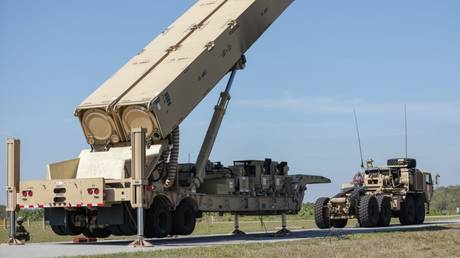
The missile couldn’t pass pre-flight checks, US Department of Defense says
A test flight on Wednesday of the US hypersonic weapon Dark Eagle, expected to become the first such missile in the country’s arsenal, was aborted at the last moment, the Pentagon has announced.
The launch of the Long-Range Hypersonic Weapon (LRHW) –or Dark Eagle, as the US military calls it– was scheduled to take place at the Cape Canaveral Space Force Station in Florida, in order “to inform our hypersonic technology development,” the US Department of Defense said, in a statement released to media outlets.
“But as a result of pre-flight checks the test did not occur,” it continued, without revealing the exact reasons for the cancellation of the LRHW firing.
The Pentagon is also claiming that, despite the setback, it “was able to successfully collect data on the performance of the ground hardware and software that will inform the continued progress toward fielding offensive hypersonic weapons.”
However, Bloomberg has pointed out that the last-minute halting of the missile test casts doubt on whether the US military will be able to meet its goal of declaring the Dark Eagle initially combat capable by September 30.
A previous test of a LRHW surface-to-surface hypersonic weapon was canceled in March, also “a result of pre-flight checks.” Navy Vice Admiral Johnny Wolfe told Congress later that month that the problem was that “a battery did not activate” in the system.
Dark Eagle, which the army is developing jointly with the navy, is expected to become the first hypersonic system fielded by the US.
In March, the Pentagon canceled its ARRW (Air-Launched Rapid Response Weapon) hypersonic air-to-ground missile program after a series of failed tests.
Analysts, including some in the West, have noted America is lagging behind Russia and China when it comes to hypersonic weapons, which are believed to be beyond the reach of existing air defense systems due to their extreme speed and high maneuverability.
In recent years, Russia has developed several hypersonic systems, including the Avangard glider, which is fitted on silo-based ICBMs, the Zircon missile for use by the Navy, and the air-launched Kinzhal hypersonic missile.
READ MORE: Iran claims hypersonic breakthrough
Moscow has deployed Kinzhals on a number of occasions during the conflict in Ukraine. In May, Russia’s Defense Ministry said that the hypersonic missile was used to deliver significant damage to a US-supplied Patriot air defense system stationed in Kiev.




